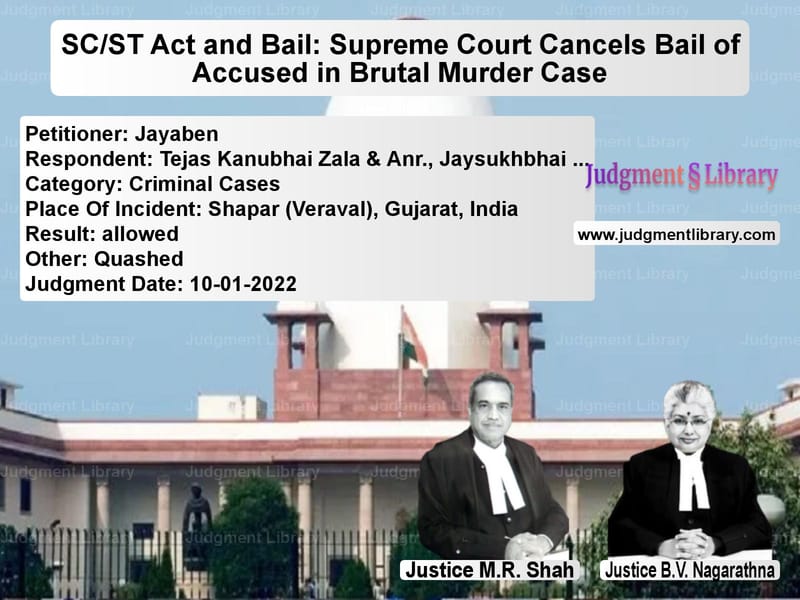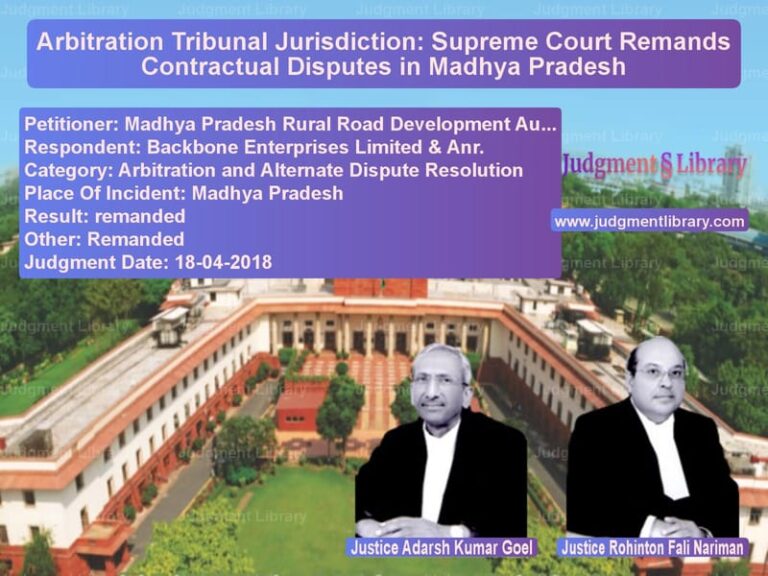SC/ST Act and Bail: Supreme Court Cancels Bail of Accused in Brutal Murder Case
The case of Jayaben v. Tejas Kanubhai Zala & Anr. and Jayaben v. Jaysukhbhai Devrajbhai Radadiya & Anr. involves the murder of the complainant’s husband, Mukeshbhai, and the legality of bail granted to the accused under the Scheduled Castes and Scheduled Tribes (Prevention of Atrocities) Act, 1989. The Supreme Court was tasked with reviewing whether the Gujarat High Court erred in granting bail despite strong evidence, including eyewitness accounts and CCTV footage.
Background of the Case
On March 10, 2018, Mukeshbhai, along with his wife (the complainant, Jayaben) and her aunt, was collecting scrap outside a factory in Shapar (Veraval). Five accused, including Tejas Kanubhai Zala and Jaysukhbhai Devrajbhai Radadiya, arrived at the scene and began abusing them. The accused then tied Mukeshbhai to the factory gate and brutally assaulted him with pipes and belts. Jayaben and her aunt were forced to leave, and when they returned with relatives, they found Mukeshbhai unconscious. He was rushed to the hospital, where he was declared dead.
A case was registered under Sections 302, 114, 323 of the Indian Penal Code, Section 135 of the Gujarat Police Act, and Section 3(2)(5) of the Scheduled Castes and Scheduled Tribes (Prevention of Atrocities) Act, 1989. The police arrested all five accused and chargesheeted them.
Arguments of the Petitioner (Jayaben, Wife of the Deceased)
- The accused committed a brutal murder, tying the victim to a gate and beating him until he died.
- The High Court ignored critical evidence, including eyewitness testimonies and CCTV footage, while granting bail.
- The complainant and her aunt were eyewitnesses and had identified all accused in the Test Identification Parade (TIP).
- The post-mortem report confirmed that the victim died due to multiple injuries caused by blunt force trauma.
- Granting bail in a case of such gravity undermines justice and emboldens criminals.
Arguments of the Respondents (Accused Tejas Kanubhai Zala and Jaysukhbhai Devrajbhai Radadiya)
- The accused had been granted bail in February 2019 and had not misused their liberty since then.
- The case against them was based primarily on the complainant’s statements, which were biased.
- The trial had progressed significantly, and most witnesses had already been examined.
- Since no new evidence had emerged, canceling bail after two and a half years would be unjust.
Key Observations of the Supreme Court
1. High Court’s Failure to Consider Evidence
The Supreme Court strongly criticized the High Court’s decision to grant bail without considering vital evidence. The Court held:
“The High Court has not at all considered the gravity of the offenses alleged and the evidence collected during the investigation, which forms part of the chargesheet.”
2. Eyewitness Accounts and CCTV Footage
The Court noted that the prosecution’s case was supported by multiple pieces of evidence, including:
- Testimonies from three eyewitnesses, including the complainant.
- CCTV footage and mobile phone videos capturing the assault.
- The post-mortem report, which confirmed the cause of death as multiple injuries.
“When there are direct eyewitness accounts and electronic evidence supporting the allegations, the High Court should not have granted bail so lightly.”
3. The Role of the State in Challenging Bail
The Supreme Court reprimanded the Gujarat government for failing to appeal against the bail order, stating:
“By not filing an appeal against the bail order in such a serious matter, the State has failed to protect the rights of the victim.”
The Court further criticized the Director of Prosecution, emphasizing the importance of taking prompt legal action in criminal cases.
4. Cancellation of Bail
The respondents argued that since they had been out on bail for two and a half years without any misuse, their bail should not be canceled. The Supreme Court rejected this argument, clarifying:
“Cancellation of bail and quashing an erroneous bail order are separate legal considerations. If the High Court’s order is found unsustainable, the necessary consequence is cancellation of bail.”
Final Judgment
The Supreme Court allowed the appeal and quashed the Gujarat High Court’s bail order. The key takeaways from the judgment are:
- The bail granted to the accused in a brutal murder case was set aside.
- The accused were ordered to surrender to jail authorities within one week.
- The Supreme Court directed the issuance of non-bailable warrants if they failed to surrender.
- The Gujarat government was advised to improve its legal response in serious criminal cases.
This ruling reinforces the importance of due diligence in granting bail and ensures that justice prevails in cases of heinous crimes.
Petitioner Name: Jayaben.Respondent Name: Tejas Kanubhai Zala & Anr., Jaysukhbhai Devrajbhai Radadiya & Anr..Judgment By: Justice M.R. Shah, Justice B.V. Nagarathna.Place Of Incident: Shapar (Veraval), Gujarat, India.Judgment Date: 10-01-2022.
Don’t miss out on the full details! Download the complete judgment in PDF format below and gain valuable insights instantly!
Download Judgment: jayaben-vs-tejas-kanubhai-zala-supreme-court-of-india-judgment-dated-10-01-2022.pdf
Directly Download Judgment: Directly download this Judgment
See all petitions in SC/ST Act Case
See all petitions in Bail and Anticipatory Bail
See all petitions in Murder Cases
See all petitions in Judgment by Mukeshkumar Rasikbhai Shah
See all petitions in Judgment by B.V. Nagarathna
See all petitions in allowed
See all petitions in Quashed
See all petitions in supreme court of India judgments January 2022
See all petitions in 2022 judgments
See all posts in Criminal Cases Category
See all allowed petitions in Criminal Cases Category
See all Dismissed petitions in Criminal Cases Category
See all partially allowed petitions in Criminal Cases Category







